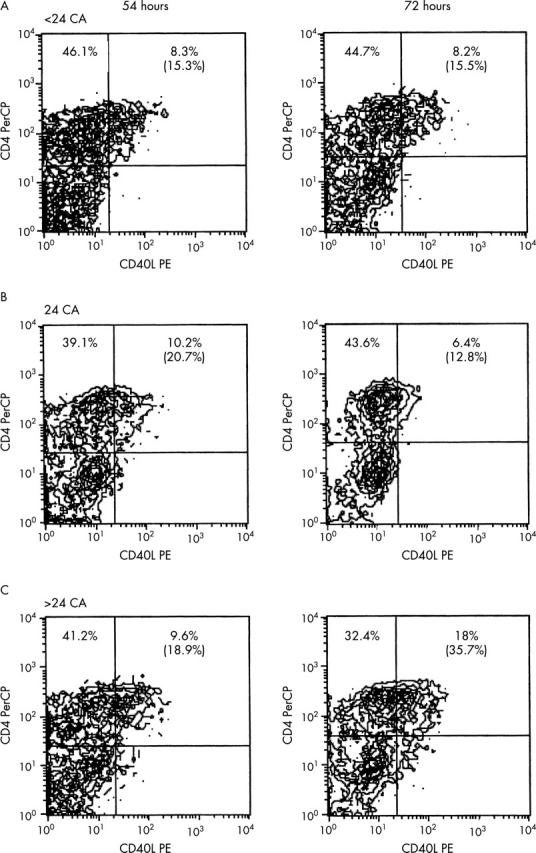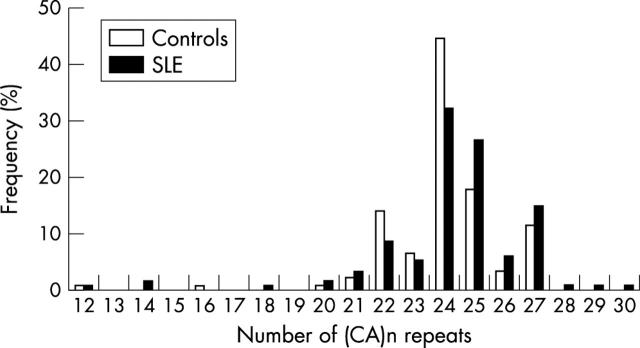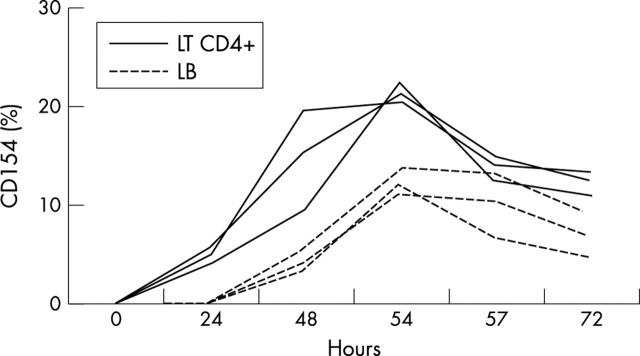Abstract
Objective: To investigate the association of the (CA)n dinucleotide repeat in the 3' untranslated region (3'UTR) of the CD154 gene with systemic lupus erythematosus (SLE), and its functional role in protein expression.
Methods: The allelic and genotypic distributions of the polymorphism were compared in 80 patients with SLE and 80 controls. A complete clinical and analytical database was recorded in each patient in order to correlate the clinical manifestations in SLE with different alleles. To investigate the functional role of the polymorphism, the CD154 protein expression on activated lymphocytes from healthy homozygous controls was evaluated by flow cytometry.
Results: The 24 CA allele was the most represented in controls (p = 0.029), whereas the alleles containing >24 CA repeats were found in patients (p = 0.0043). Furthermore, when only homozygous women were considered, most controls carried two 24 CA alleles (p = 0.041), whereas most patients carried two alleles containing >24 CA repeats (p = 0.032). Also, patients carrying at least one 24 CA allele had less neurological involvement (p = 0.034), and carriers of at least one allele with fewer than 24 CA repeats presented more livedo reticularis (p = 0.006) and anti-Sm (p = 0.01) and anti-RNP (p = 0.038) autoantibodies. CD154 maximum expression in activated lymphocytes from all controls was reached after 54 hours, but it was more prolonged in controls carrying two alleles with >24 CA repeats (p = 0.0068).
Conclusion: The CD154 3'UTR microsatellite is associated with SLE, and the most represented alleles in patients were accompanied by a more prolonged protein expression in activated lymphocytes from controls.
Full Text
The Full Text of this article is available as a PDF (375.1 KB).
Figure 1 .
Frequency distribution of the number of (CA)n repeats in patients with SLE and controls.
Figure 2 .
CD154 kinetic expression on PBMC from controls stimulated with PHA and anti-CD28. PBMC from three homozygote controls carrying two 24 CA alleles were stimulated with PHA and anti-CD28 antibody and were harvested after 24, 48, 54, 57, and 72 hours. CD154 expression was measured by flow cytometry on CD4+ T lymphocytes (continuous line) and B cells (dotted lines).
Figure 3 .

Flow cytometry plots showing the CD154 expression on T lymphocytes from representative controls. PBMC from controls with different genotypes were activated with PHA and anti-CD28 for 54 (first column) or 72 hours (last column). Percentages of CD4+CD154- and CD4+CD154+ are indicated (left and right of each plot, respectively), and the percentage of the CD4+CD154+ cells from the total of CD4+ cells is shown in parenthesis. All the CD4+ cells were CD14-, all of them being CD4+ T lymphocytes.
Selected References
These references are in PubMed. This may not be the complete list of references from this article.
- Alderson M. R., Armitage R. J., Tough T. W., Strockbine L., Fanslow W. C., Spriggs M. K. CD40 expression by human monocytes: regulation by cytokines and activation of monocytes by the ligand for CD40. J Exp Med. 1993 Aug 1;178(2):669–674. doi: 10.1084/jem.178.2.669. [DOI] [PMC free article] [PubMed] [Google Scholar]
- Barnhart B., Kosinski P. A., Wang Z., Ford G. S., Kiledjian M., Covey L. R. Identification of a complex that binds to the CD154 3' untranslated region: implications for a role in message stability during T cell activation. J Immunol. 2000 Oct 15;165(8):4478–4486. doi: 10.4049/jimmunol.165.8.4478. [DOI] [PubMed] [Google Scholar]
- Biancone L., Cantaluppi V., Camussi G. CD40-CD154 interaction in experimental and human disease (review). Int J Mol Med. 1999 Apr;3(4):343–353. doi: 10.3892/ijmm.3.4.343. [DOI] [PubMed] [Google Scholar]
- Blin N., Stafford D. W. A general method for isolation of high molecular weight DNA from eukaryotes. Nucleic Acids Res. 1976 Sep;3(9):2303–2308. doi: 10.1093/nar/3.9.2303. [DOI] [PMC free article] [PubMed] [Google Scholar]
- Caux C., Burdin N., Galibert L., Hermann P., Renard N., Servet-Delprat C., Banchereau J. Functional CD40 on B lymphocytes and dendritic cells. Res Immunol. 1994 Mar-Apr;145(3):235–249. doi: 10.1016/s0923-2494(94)80190-8. [DOI] [PubMed] [Google Scholar]
- Citores M. J., Pérez-Aciego P., Rodríguez-Gallego C., Contreras-Martín B., García-Laorden I., Durántez A. CD154 polymorphism in Spanish populations. Differences in the allelic distribution between Canary islanders and Peninsulars. Eur J Immunogenet. 2000 Jun;27(3):141–144. doi: 10.1046/j.1365-2370.2000.00220.x. [DOI] [PubMed] [Google Scholar]
- Conne B., Stutz A., Vassalli J. D. The 3' untranslated region of messenger RNA: A molecular 'hotspot' for pathology? Nat Med. 2000 Jun;6(6):637–641. doi: 10.1038/76211. [DOI] [PubMed] [Google Scholar]
- Cooper G. S., Dooley M. A., Treadwell E. L., St Clair E. W., Parks C. G., Gilkeson G. S. Hormonal, environmental, and infectious risk factors for developing systemic lupus erythematosus. Arthritis Rheum. 1998 Oct;41(10):1714–1724. doi: 10.1002/1529-0131(199810)41:10<1714::AID-ART3>3.0.CO;2-U. [DOI] [PubMed] [Google Scholar]
- Crow M. K., Kirou K. A. Regulation of CD40 ligand expression in systemic lupus erythematosus. Curr Opin Rheumatol. 2001 Sep;13(5):361–369. doi: 10.1097/00002281-200109000-00004. [DOI] [PubMed] [Google Scholar]
- Datta S. K., Kalled S. L. CD40-CD40 ligand interaction in autoimmune disease. Arthritis Rheum. 1997 Oct;40(10):1735–1745. doi: 10.1002/art.1780401002. [DOI] [PubMed] [Google Scholar]
- Desai-Mehta A., Lu L., Ramsey-Goldman R., Datta S. K. Hyperexpression of CD40 ligand by B and T cells in human lupus and its role in pathogenic autoantibody production. J Clin Invest. 1996 May 1;97(9):2063–2073. doi: 10.1172/JCI118643. [DOI] [PMC free article] [PubMed] [Google Scholar]
- Devi B. S., Van Noordin S., Krausz T., Davies K. A. Peripheral blood lymphocytes in SLE--hyperexpression of CD154 on T and B lymphocytes and increased number of double negative T cells. J Autoimmun. 1998 Oct;11(5):471–475. doi: 10.1006/jaut.1998.0213. [DOI] [PubMed] [Google Scholar]
- Ford G. S., Barnhart B., Shone S., Covey L. R. Regulation of CD154 (CD40 ligand) mRNA stability during T cell activation. J Immunol. 1999 Apr 1;162(7):4037–4044. [PubMed] [Google Scholar]
- Foy T. M., Aruffo A., Bajorath J., Buhlmann J. E., Noelle R. J. Immune regulation by CD40 and its ligand GP39. Annu Rev Immunol. 1996;14:591–617. doi: 10.1146/annurev.immunol.14.1.591. [DOI] [PubMed] [Google Scholar]
- Gauchat J. F., Henchoz S., Fattah D., Mazzei G., Aubry J. P., Jomotte T., Dash L., Page K., Solari R., Aldebert D. CD40 ligand is functionally expressed on human eosinophils. Eur J Immunol. 1995 Mar;25(3):863–865. doi: 10.1002/eji.1830250335. [DOI] [PubMed] [Google Scholar]
- Gauchat J. F., Henchoz S., Mazzei G., Aubry J. P., Brunner T., Blasey H., Life P., Talabot D., Flores-Romo L., Thompson J. Induction of human IgE synthesis in B cells by mast cells and basophils. Nature. 1993 Sep 23;365(6444):340–343. doi: 10.1038/365340a0. [DOI] [PubMed] [Google Scholar]
- Gomolka M., Menninger H., Saal J. E., Lemmel E. M., Albert E. D., Niwa O., Epplen J. T., Epplen C. Immunoprinting: various genes are associated with increased risk to develop rheumatoid arthritis in different groups of adult patients. J Mol Med (Berl) 1995 Jan;73(1):19–29. doi: 10.1007/BF00203615. [DOI] [PubMed] [Google Scholar]
- Graf D., Korthäuer U., Mages H. W., Senger G., Kroczek R. A. Cloning of TRAP, a ligand for CD40 on human T cells. Eur J Immunol. 1992 Dec;22(12):3191–3194. doi: 10.1002/eji.1830221226. [DOI] [PubMed] [Google Scholar]
- Grammer A. C., Bergman M. C., Miura Y., Fujita K., Davis L. S., Lipsky P. E. The CD40 ligand expressed by human B cells costimulates B cell responses. J Immunol. 1995 May 15;154(10):4996–5010. [PubMed] [Google Scholar]
- Harigai M., Hara M., Fukasawa C., Nakazawa S., Kawaguchi Y., Kamatani N., Kashiwazaki S. Responsiveness of peripheral blood B cells to recombinant CD40 ligand in patients with systemic lupus erythematosus. Lupus. 1999;8(3):227–233. doi: 10.1191/096120399678847678. [DOI] [PubMed] [Google Scholar]
- Harley J. B., Moser K. L., Gaffney P. M., Behrens T. W. The genetics of human systemic lupus erythematosus. Curr Opin Immunol. 1998 Dec;10(6):690–696. doi: 10.1016/s0952-7915(98)80090-3. [DOI] [PubMed] [Google Scholar]
- Higuchi Tetsuya, Aiba Yuichi, Nomura Takashi, Matsuda Junichiro, Mochida Keiji, Suzuki Misao, Kikutani Hitoshi, Honjo Tasuku, Nishioka Kiyoshi, Tsubata Takeshi. Cutting Edge: Ectopic expression of CD40 ligand on B cells induces lupus-like autoimmune disease. J Immunol. 2002 Jan 1;168(1):9–12. doi: 10.4049/jimmunol.168.1.9. [DOI] [PubMed] [Google Scholar]
- Hollenbaugh D., Mischel-Petty N., Edwards C. P., Simon J. C., Denfeld R. W., Kiener P. A., Aruffo A. Expression of functional CD40 by vascular endothelial cells. J Exp Med. 1995 Jul 1;182(1):33–40. doi: 10.1084/jem.182.1.33. [DOI] [PMC free article] [PubMed] [Google Scholar]
- Horner A. A., Jabara H., Ramesh N., Geha R. S. gamma/delta T lymphocytes express CD40 ligand and induce isotype switching in B lymphocytes. J Exp Med. 1995 Mar 1;181(3):1239–1244. doi: 10.1084/jem.181.3.1239. [DOI] [PMC free article] [PubMed] [Google Scholar]
- Johnson-Léger C., Christensen J., Klaus G. G. CD28 co-stimulation stabilizes the expression of the CD40 ligand on T cells. Int Immunol. 1998 Aug;10(8):1083–1091. doi: 10.1093/intimm/10.8.1083. [DOI] [PubMed] [Google Scholar]
- Kato K., Santana-Sahagún E., Rassenti L. Z., Weisman M. H., Tamura N., Kobayashi S., Hashimoto H., Kipps T. J. The soluble CD40 ligand sCD154 in systemic lupus erythematosus. J Clin Invest. 1999 Oct;104(7):947–955. doi: 10.1172/JCI7014. [DOI] [PMC free article] [PubMed] [Google Scholar]
- Korthäuer U., Graf D., Mages H. W., Brière F., Padayachee M., Malcolm S., Ugazio A. G., Notarangelo L. D., Levinsky R. J., Kroczek R. A. Defective expression of T-cell CD40 ligand causes X-linked immunodeficiency with hyper-IgM. Nature. 1993 Feb 11;361(6412):539–541. doi: 10.1038/361539a0. [DOI] [PubMed] [Google Scholar]
- Koshy M., Berger D., Crow M. K. Increased expression of CD40 ligand on systemic lupus erythematosus lymphocytes. J Clin Invest. 1996 Aug 1;98(3):826–837. doi: 10.1172/JCI118855. [DOI] [PMC free article] [PubMed] [Google Scholar]
- Lederman S. The role of CD154 (CD40-ligand) in costimulation. Transplant Proc. 2001 Feb-Mar;33(1-2):202–206. doi: 10.1016/s0041-1345(00)01975-8. [DOI] [PubMed] [Google Scholar]
- Lederman S., Yellin M. J., Krichevsky A., Belko J., Lee J. J., Chess L. Identification of a novel surface protein on activated CD4+ T cells that induces contact-dependent B cell differentiation (help). J Exp Med. 1992 Apr 1;175(4):1091–1101. doi: 10.1084/jem.175.4.1091. [DOI] [PMC free article] [PubMed] [Google Scholar]
- Litt M., Hauge X., Sharma V. Shadow bands seen when typing polymorphic dinucleotide repeats: some causes and cures. Biotechniques. 1993 Aug;15(2):280–284. [PubMed] [Google Scholar]
- MacDonald K. P., Nishioka Y., Lipsky P. E., Thomas R. Functional CD40 ligand is expressed by T cells in rheumatoid arthritis. J Clin Invest. 1997 Nov 1;100(9):2404–2414. doi: 10.1172/JCI119781. [DOI] [PMC free article] [PubMed] [Google Scholar]
- Naumova A. K., Plenge R. M., Bird L. M., Leppert M., Morgan K., Willard H. F., Sapienza C. Heritability of X chromosome--inactivation phenotype in a large family. Am J Hum Genet. 1996 Jun;58(6):1111–1119. [PMC free article] [PubMed] [Google Scholar]
- Parra E., Mustelin T., Dohlsten M., Mercola D. Identification of a CD28 response element in the CD40 ligand promoter. J Immunol. 2001 Feb 15;166(4):2437–2443. doi: 10.4049/jimmunol.166.4.2437. [DOI] [PubMed] [Google Scholar]
- Pinto F., Cabrera V. M., González A. M., Larruga J. M., Noya A., Hernández M. Human enzyme polymorphism in the Canary Islands. VI. Northwest African influence. Hum Hered. 1994 May-Jun;44(3):156–161. doi: 10.1159/000154208. [DOI] [PubMed] [Google Scholar]
- Pérez-Melgosa M., Hollenbaugh D., Wilson C. B. Cutting edge: CD40 ligand is a limiting factor in the humoral response to T cell-dependent antigens. J Immunol. 1999 Aug 1;163(3):1123–1127. [PubMed] [Google Scholar]
- Rigby W. F., Waugh M. G., Hamilton B. J. Characterization of RNA binding proteins associated with CD40 ligand (CD154) mRNA turnover in human T lymphocytes. J Immunol. 1999 Oct 15;163(8):4199–4206. [PubMed] [Google Scholar]
- Santos-Argumedo L., Alvarez-Maya I., Romero-Ramírez H., Flores-Romo L. Enforced and prolonged CD40 ligand expression triggers autoantibody production in vivo. Eur J Immunol. 2001 Dec;31(12):3484–3492. doi: 10.1002/1521-4141(200112)31:12<3484::aid-immu3484>3.0.co;2-5. [DOI] [PubMed] [Google Scholar]
- Seyama K., Kira S., Ishidoh K., Souma S., Miyakawa T., Kominami E. Genomic structure and PCR-SSCP analysis of the human CD40 ligand gene: its application to prenatal screening for X-linked hyper-IgM syndrome. Hum Genet. 1996 Feb;97(2):180–185. doi: 10.1007/BF02265262. [DOI] [PubMed] [Google Scholar]
- Stamenkovic I., Clark E. A., Seed B. A B-lymphocyte activation molecule related to the nerve growth factor receptor and induced by cytokines in carcinomas. EMBO J. 1989 May;8(5):1403–1410. doi: 10.1002/j.1460-2075.1989.tb03521.x. [DOI] [PMC free article] [PubMed] [Google Scholar]
- Suárez A., Mozo L., Gayo A., Zamorano J., Gutierrez C. Requirement of a second signal via protein kinase C or protein kinase A for maximal expression of CD40 ligand. Involvement of transcriptional and posttranscriptional mechanisms. Eur J Immunol. 1997 Nov;27(11):2822–2829. doi: 10.1002/eji.1830271112. [DOI] [PubMed] [Google Scholar]
- Tan E. M., Cohen A. S., Fries J. F., Masi A. T., McShane D. J., Rothfield N. F., Schaller J. G., Talal N., Winchester R. J. The 1982 revised criteria for the classification of systemic lupus erythematosus. Arthritis Rheum. 1982 Nov;25(11):1271–1277. doi: 10.1002/art.1780251101. [DOI] [PubMed] [Google Scholar]
- Vakkalanka R. K., Woo C., Kirou K. A., Koshy M., Berger D., Crow M. K. Elevated levels and functional capacity of soluble CD40 ligand in systemic lupus erythematosus sera. Arthritis Rheum. 1999 May;42(5):871–881. doi: 10.1002/1529-0131(199905)42:5<871::AID-ANR5>3.0.CO;2-J. [DOI] [PubMed] [Google Scholar]
- Valentini G., Romano M. F., Naclerio C., Bisogni R., Lamberti A., Turco M. C., Venuta S. Increased expression of CD40 ligand in activated CD4+ T lymphocytes of systemic sclerosis patients. J Autoimmun. 2000 Aug;15(1):61–66. doi: 10.1006/jaut.2000.0387. [DOI] [PubMed] [Google Scholar]
- Van Kooten C., Banchereau J. CD40-CD40 ligand: a multifunctional receptor-ligand pair. Adv Immunol. 1996;61:1–77. doi: 10.1016/s0065-2776(08)60865-2. [DOI] [PubMed] [Google Scholar]
- Williamson G. G., Pennebaker J., Boyle J. A. Clinical characteristics of patients with rheumatic disorders who possess antibodies against ribonucleoprotein particles. Arthritis Rheum. 1983 Apr;26(4):509–515. doi: 10.1002/art.1780260409. [DOI] [PubMed] [Google Scholar]
- Yellin M. J., D'Agati V., Parkinson G., Han A. S., Szema A., Baum D., Estes D., Szabolcs M., Chess L. Immunohistologic analysis of renal CD40 and CD40L expression in lupus nephritis and other glomerulonephritides. Arthritis Rheum. 1997 Jan;40(1):124–134. doi: 10.1002/art.1780400117. [DOI] [PubMed] [Google Scholar]
- Yellin M. J., Sippel K., Inghirami G., Covey L. R., Lee J. J., Sinning J., Clark E. A., Chess L., Lederman S. CD40 molecules induce down-modulation and endocytosis of T cell surface T cell-B cell activating molecule/CD40-L. Potential role in regulating helper effector function. J Immunol. 1994 Jan 15;152(2):598–608. [PubMed] [Google Scholar]
- Yellin M. J., Winikoff S., Fortune S. M., Baum D., Crow M. K., Lederman S., Chess L. Ligation of CD40 on fibroblasts induces CD54 (ICAM-1) and CD106 (VCAM-1) up-regulation and IL-6 production and proliferation. J Leukoc Biol. 1995 Aug;58(2):209–216. doi: 10.1002/jlb.58.2.209. [DOI] [PubMed] [Google Scholar]
- ter Borg E. J., Groen H., Horst G., Limburg P. C., Wouda A. A., Kallenberg C. G. Clinical associations of antiribonucleoprotein antibodies in patients with systemic lupus erythematosus. Semin Arthritis Rheum. 1990 Dec;20(3):164–173. doi: 10.1016/0049-0172(90)90057-m. [DOI] [PubMed] [Google Scholar]
- van Kooten C., Gaillard C., Galizzi J. P., Hermann P., Fossiez F., Banchereau J., Blanchard D. B cells regulate expression of CD40 ligand on activated T cells by lowering the mRNA level and through the release of soluble CD40. Eur J Immunol. 1994 Apr;24(4):787–792. doi: 10.1002/eji.1830240402. [DOI] [PubMed] [Google Scholar]




